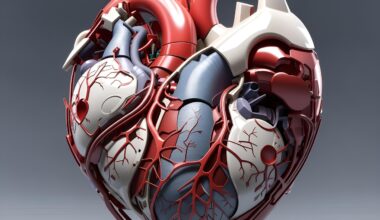The Relationship Between Hormones and Weight
Weight loss and management represent a considerable challenge for many individuals. Understanding the internal biological processes, specifically the role of hormones, plays a crucial role in this pursuit. Hormones, which are chemical messengers in the body, influence numerous bodily functions, including metabolism, appetite, and fat storage. For effective weight loss, it is essential to recognize how these hormones operate and interact with lifestyle factors. Insulin, leptin, ghrelin, and cortisol are just a few examples of key hormones that impact weight management. Insulin regulates blood sugar levels and fat storage while leptin and ghrelin manage hunger signals. Additionally, cortisol is related to stress and can lead to weight gain if levels remain elevated for extended periods. By gaining insight into these hormonal influences, individuals can develop personalized strategies for weight control. Maintaining balanced hormone levels through diet, exercise, and effective stress management can significantly enhance weight loss efforts. Therefore, informing oneself about the hormone-weight relationship is integral to any successful weight management journey.
Understanding Hormones’ Functions in Weight Management
The complex interplay between hormones and weight is vital for successful weight management. Hormones, produced by various glands, communicate with organs and tissues to regulate bodily processes. They modulate energy levels, appetite, and metabolism, influencing how our bodies store or burn fat. For example, insulin, produced by the pancreas, helps cells absorb glucose from the bloodstream. When insulin functions properly, it can help maintain a healthy weight. However, when insulin resistance occurs, it may lead to weight gain and obesity. Similarly, leptin, produced by adipose tissue, informs the brain about existing fat reserves, influencing hunger and energy expenditure. Conversely, ghrelin, often termed the ‘hunger hormone,’ signals the brain when it’s time to eat, promoting appetite. Moreover, cortisol, a hormone released in response to stress, can lead to increased appetite and fat accumulation, especially around the abdomen if elevated. Recognizing these hormonal dynamics allows individuals to adopt correct approaches to facilitate weight loss and sustain it over time, ensuring a healthier lifestyle and successful weight management.
Dietary choices play a significant role in regulating hormonal balance, which can affect weight loss outcomes. Consuming a diet rich in whole foods, such as fruits, vegetables, lean proteins, and healthy fats, supports hormone production and signaling. For instance, healthy fats found in avocados and nuts are essential for producing sex hormones like estrogen and testosterone. Fiber-rich foods can enhance leptin sensitivity, helping regulate hunger and stave off overeating. Simultaneously, excessive sugar and processed foods lead to repeated insulin spikes, causing insulin resistance over time. By reducing refined carbohydrates and incorporating more whole foods into one’s diet, individuals can foster better hormonal health. Moreover, hydration is crucial; water supports metabolic processes, helping maintain a healthy balance of hormones. It is essential to recognize the importance of consistent meal timing and mindful eating practices in promoting satiety and balanced hormone levels. In this way, utilizing dietary strategies to maintain hormonal health can set the foundation for effective weight management. Creating a nourishing meal plan tailored towards hormonal well-being can lead to lasting weight loss success.
Exercise’s Effect on Hormones Related to Weight Loss
Physical activity plays a crucial role in the intricate relationship between hormones and weight management. Engaging in regular exercise helps regulate hormones that promote weight loss and body composition changes. When you work out, your body produces endorphins, which can enhance your mood and motivation. Exercise also stimulates the release of hormones that promote fat loss, such as adrenaline and growth hormone. Additionally, both aerobic and resistance training can improve insulin sensitivity, allowing the body to use glucose more efficiently while reducing fat storage. Moreover, consistent exercise helps enhance leptin sensitivity, making it easier to recognize fullness. Conversely, a sedentary lifestyle can disrupt normal hormonal pathways, leading to imbalances that may complicate weight loss efforts. Maintaining a balanced exercise routine targeting both cardiovascular fitness and strength training can optimize hormonal responses, thus easing the path to a healthier weight. Furthermore, setting realistic exercise goals can create a sustainable routine that positively influences hormonal regulation and overall well-being. Each person’s fitness journey is unique; embracing the benefits of physical activity on hormones aids in attaining lasting weight management.
Hormonal imbalances can result from various external factors, including stress and inadequate sleep, both of which influence weight management. Chronic stress results in elevated cortisol levels, which can lead to increased appetite and cravings for unhealthy foods. When stress becomes a constant in life, cortisol’s disruptive influence can hinder weight loss efforts, contributing to unwanted weight gain. Adequate sleep plays a vital role in hormone regulation as well. Lack of sleep can cause imbalances in ghrelin and leptin, leading to increased feelings of hunger and a distorted sense of fullness. Furthermore, poor sleep quality interferes with overall metabolic processes, demanding more energy and subsequently impacting weight management strategies. It’s essential to incorporate stress-reducing techniques, such as mindfulness, yoga, or meditation into one’s routine, as these can help lower cortisol levels effectively. Prioritizing a restful night’s sleep enhances overall health while supporting weight loss efforts. Creating a consistent bedtime routine can significantly improve hormonal balance, thereby promoting better appetite control and energy management. Ultimately, acknowledging the interplay of lifestyle determinants is vital for achieving successful weight loss.
Conclusion: The Importance of Hormonal Awareness in Weight Loss
Monitoring hormonal balance proves pivotal in the journey of weight loss and management. Gaining insight into how hormones affect body weight can empower individuals to make informed choices regarding lifestyle changes, dietary habits, and exercise routines. Understanding the role of hormones such as insulin, leptin, ghrelin, and cortisol influences our journey towards better health. Fostering balanced hormone levels through proper nutrition, regular physical activity, stress management, and adequate sleep can lead to effective weight loss outcomes. This awareness not only creates a solid foundation for achieving desired weight goals but also ensures long-term maintenance of those results. Adopting healthy practices while remaining cognizant of individual hormonal structures transforms weight management from mere dietary restrictions into a holistic lifestyle shift. As individuals comprehend the significant role of hormones in their lives, they can navigate their paths towards sustainable health and weight solutions with confidence. Lastly, consulting with healthcare professionals specializing in hormonal imbalances can provide personalized insights and strategies, enhancing the journey towards a healthier body and mind.
As the understanding of hormones’ roles in weight management continues to evolve, it’s essential for individuals to stay informed and adaptive to best practices. This ongoing education can significantly influence their approaches to diet and lifestyle choices. The integration of scientific knowledge regarding hormone interactions, metabolism, and dietary influences on weight is essential for developing effective, evidence-based strategies. Engaging with healthcare professionals can offer personalized analysis and recommendations for maintaining a balanced hormonal environment conducive to weight loss. Regularly reading up on the latest research provides the foundation for increased understanding and informed decision-making. Additionally, connecting with supportive communities, whether online or locally, can bolster motivation and provide guidance. Ultimately, the journey to a healthier weight encompasses multiple facets, including personal responsibility, education, and support. Emphasizing the importance of hormones in achieving optimal weight management allows individuals to take charge of their health effectively. By assimilating these insights into daily living, lasting results are attainable that pave the way to a healthier future.
Understanding the pervasive influence of hormones not only aids in weight loss endeavors but also enhances overall health and vitality. Emphasizing the significance of personalized approaches and strategies while incorporating dietary, physical, and lifestyle modifications leads to sustainable success. It’s crucial to adopt a mindful perspective towards food choices, exercise routines, emotional well-being, and their interconnected roles within the body. The journey to weight loss may fluctuate; being compassionate with oneself can lead to improved resilience and motivation. Remember, weight management isn’t solely a numerical goal, it’s about creating a balanced lifestyle aligned with individual needs and preferences. Thus, blending hormonal awareness with tailored strategies fosters a holistic approach, allowing for adaptations that promote better health overall. Embracing the effects of hormones on appetite and metabolism inculcates healthier habits leading to impactful change. By reminding oneself of the importance of being patient and understanding the body’s signals, success in weight loss efforts becomes a more achievable feat. In conclusion, being informed, adaptive, and compassionate on this journey enhances the likelihood of achieving sustainable weight management while cherishing one’s health.


